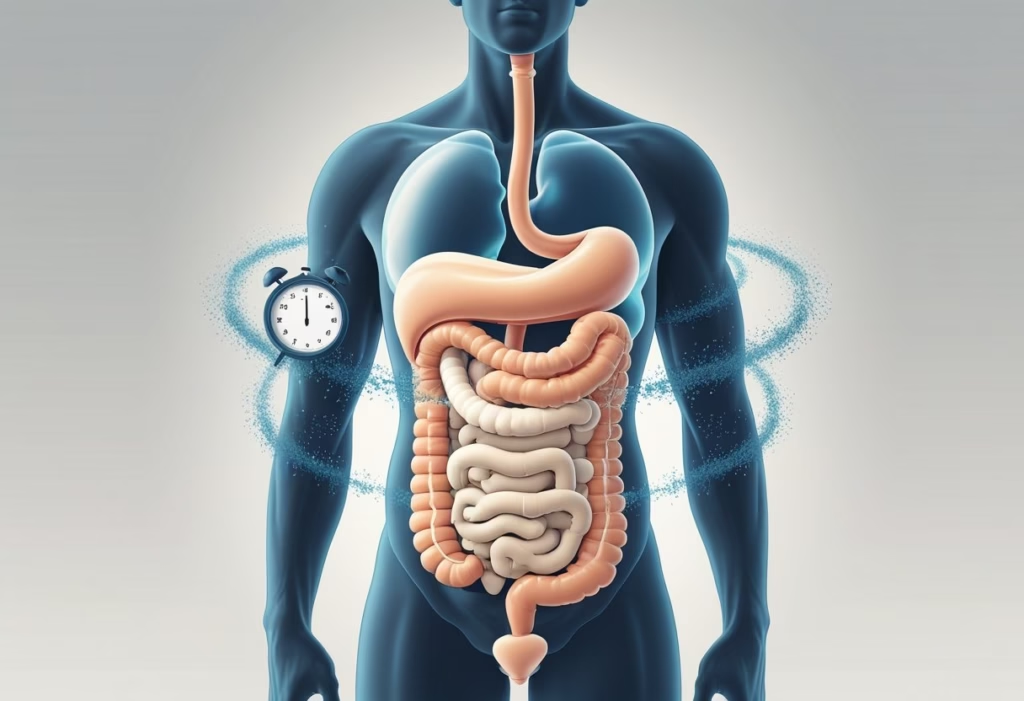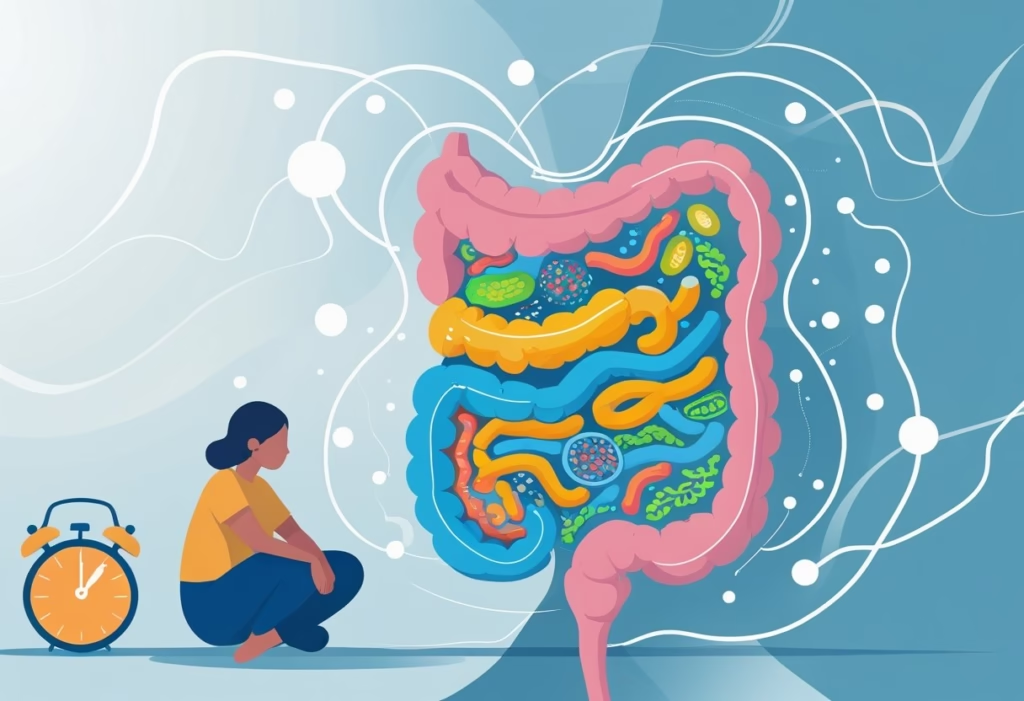Fasting can paradoxically increase certain digestive smells in the short term, even though it gives your digestive system a break. When you fast, your body shifts into different metabolic states that produce distinct odors, from breath that smells fruity or acetone-like due to ketosis to changes in body odor as your system processes stored fats and proteins. The relationship between fasting and digestive smells depends on factors like how long you fast, what happens to your gut bacteria during food restriction, and whether underlying digestive issues become more noticeable when you stop eating.

Fasting does not automatically reduce digestive smells and may temporarily worsen them, but understanding the metabolic and microbial changes involved can help you manage these effects. The odors you experience during fasting often signal specific processes happening in your body. Ketone production, shifts in your gut microbiome, dehydration, and the release of toxins from fat breakdown all contribute to changes in how you smell.
You’ll learn why fasting triggers these smell changes, what role your gut bacteria plays, and which fasting-related odors are normal versus which ones suggest a problem. The article covers practical ways to minimize unpleasant smells through hydration and nutrient timing, compares different fasting approaches and their effects on digestive outcomes, and explains when persistent or unusual odors during fasting warrant medical attention. This information is for educational purposes and should not replace professional medical advice, diagnosis, or treatment.
How Fasting Influences Digestive Smells

Fasting triggers metabolic shifts that directly affect odor production through ketone formation, bacterial activity changes, and cellular cleanup processes. These changes explain why breath, urine, and body odor often smell different during fasting periods.
Mechanisms Behind Odor Changes While Fasting
When you fast, your digestive system experiences reduced activity because no new food enters for breakdown. This slowdown affects the gut bacteria that normally ferment food particles. With less material to process, these microbes produce fewer sulfur compounds and volatile organic compounds that contribute to typical digestive odors.
The migrating motor complex activates more frequently during fasting. This cleaning wave pushes out residual matter from your intestines, which can temporarily release stored waste products that carry stronger smells. Your body also redirects energy from digestion to cellular repair, changing the chemical composition of compounds released through breath and skin.
Common mistake: Many people assume fasting eliminates all odors immediately. Instead, the first 24-48 hours often produce stronger smells as your system releases accumulated waste. This is normal and temporary.
Reduced saliva production during fasting also matters. Less saliva means fewer enzymes to break down bacteria in your mouth, which can intensify breath odor before ketosis fully develops.
Ketosis and Production of Digestive Smells
After 12-16 hours without food, your body depletes glucose stores and begins breaking down fat for energy. This process produces ketones: acetoacetate, beta-hydroxybutyrate, and acetone. Acetone cannot be used for energy, so your body expels it through breath and urine.
This acetone creates a distinctive fruity or nail polish remover smell. It’s most noticeable on your breath because lungs efficiently eliminate volatile compounds. The intensity varies based on how deeply you’re in ketosis and your individual metabolism.
What makes it worse: Dehydration concentrates ketones in your breath and urine. Drinking less than 8 cups of water daily amplifies the smell significantly.
The smell typically peaks around days 2-4 of fasting, then often decreases as your body adapts to using ketones more efficiently. Some people never notice a strong odor, while others experience it intensely. This variation depends on your metabolic rate and how quickly you enter ketosis.
Detoxification and Release of Odorous Compounds
Your liver increases detoxification activity during fasting, processing stored toxins from fat cells. As fat breaks down, it releases accumulated environmental chemicals, metabolic by-products, and other compounds trapped in adipose tissue. These substances exit through urine, sweat, and breath, carrying distinct odors.
Autophagy, your body’s cellular cleaning process, accelerates during fasting. This cleanup produces waste materials that your kidneys and liver must filter out. The by-products of this process can temporarily increase body odor and change urine smell to something stronger or more pungent.
When to see a doctor: If you notice ammonia-smelling breath (not fruity), this suggests your body is breaking down muscle protein instead of fat. This indicates inadequate nutrition or an underlying metabolic issue requiring medical evaluation. Similarly, extremely strong or foul-smelling urine that persists beyond the first week warrants a medical consultation.
What usually helps: Staying well-hydrated (10-12 cups daily), maintaining electrolyte balance, and practicing good oral hygiene reduce odor intensity without stopping the detoxification benefits of fasting.
The Connection Between Fasting, Gut Microbiome, and Smell

Fasting restructures your gut’s bacterial populations and metabolic processes, which directly influences the production of odorous compounds in your digestive tract. These changes affect fermentation patterns, gas composition, and the speed at which matter moves through your intestines.
Microbial Diversity Shifts During Fasting
When you fast, your gut microbiome undergoes measurable compositional changes that alter which gases and volatile compounds your bacteria produce. Research on time-restricted eating shows that microbial richness can increase significantly during fasting periods, with one study finding higher richness in participants following a 25-day fasting regimen compared to controls.
Your beneficial bacteria respond differently to fasting than putrefactive species. During food restriction, bacteria that ferment dietary fiber receive less substrate, while those that feed on mucin layers and cellular debris may temporarily increase. This shift affects the ratio of gases produced, particularly hydrogen, methane, and hydrogen sulfide—the primary contributors to digestive odors.
A common mistake is assuming that increased gut bacteria diversity always reduces smell. The type of bacteria matters more than quantity. Some diverse microbiomes produce more odorous metabolites if dominated by protein-fermenting species rather than carbohydrate-fermenting ones.
Studies on Ramadan fasting demonstrate that alpha diversity indices like the abundance-based coverage estimator increase after fasting periods, though the functional implications for odor production depend on which specific bacterial families expand.
Fermentation, Putrefaction, and Gas Formation
The biochemical processes generating digestive smells change substantially when you stop eating. Normally, your gut bacteria ferment undigested carbohydrates and proteins, producing short-chain fatty acids, gases, and aromatic compounds.
During fasting, carbohydrate fermentation decreases because you’re not consuming fiber or resistant starches. This reduces production of gases like carbon dioxide and hydrogen, which are relatively odorless. However, protein putrefaction—the bacterial breakdown of proteins and amino acids—becomes proportionally more significant.
Putrefactive bacteria in your colon produce particularly malodorous compounds:
- Hydrogen sulfide (rotten egg smell)
- Ammonia (sharp, pungent odor)
- Indole and skatole (fecal odor)
- Cadaverine and putrescine (decaying flesh smell)
When you fast, residual proteins from sloughed intestinal cells and mucus become the primary substrate for bacterial metabolism. This explains why some people notice stronger-smelling stools or gas during extended fasts, despite eating nothing. Your body continues shedding cells at a rate of approximately 50-70 grams daily, providing protein for putrefactive processes.
What makes symptoms worse: Extended fasts beyond 24-48 hours without proper hydration concentrate these metabolites. Inadequate water intake reduces dilution and transit speed, allowing more time for putrefaction.
What usually helps: Maintaining hydration and consuming fermented foods or probiotics before beginning a fast can establish a microbiome composition that favors less odorous metabolic pathways.
Impacts on Gut Motility and Odor
Fasting directly affects your intestinal transit time through changes in gut motility. When you don’t eat, the migrating motor complex (MMC)—a wave of electrical activity that sweeps through your intestines during fasting states—activates approximately every 90-120 minutes.
This cleaning wave moves residual material, bacteria, and cellular debris through your system. Faster transit generally reduces odor because bacteria have less time to ferment and putrefy contents. However, some people experience the opposite effect: slower motility during fasting due to reduced mechanical stimulation from food bulk.
Motility disorders complicate this relationship. If you have conditions like irritable bowel syndrome or gastroparesis, fasting may worsen constipation and allow bacterial overgrowth in stagnant intestinal segments. This creates more time for putrefaction and increases malodorous gas production.
Your gut motility also influences which bacteria colonize different intestinal regions. Slower movement allows bacteria to migrate proximally into the small intestine, where they shouldn’t normally thrive. This bacterial overgrowth produces excessive hydrogen and methane gases, contributing to bloating and smell.
When to see a doctor: If fasting causes severe abdominal distension, persistent foul-smelling diarrhea, or changes in stool odor that persist after refeeding, consult a gastroenterologist. These symptoms may indicate small intestinal bacterial overgrowth (SIBO) or other motility disorders requiring evaluation.
Medical disclaimer: This information is for educational purposes and should not replace professional medical advice. Individual responses to fasting vary based on existing health conditions, medications, and gut microbiome composition.
Common Digestive Concerns and Smell During Fasting
Fasting can trigger several digestive changes that directly affect body odor and breath, primarily through altered gut motility, bacterial fermentation, and gastric acid patterns. These changes often manifest as bloating, constipation, or reflux, each contributing to odor production through distinct physiological mechanisms.
Bloating, Gas, and Irregular Bowel Movements
When you fast, your digestive system slows down significantly, reducing the muscular contractions that move food through your intestines. This slower motility allows gut bacteria more time to ferment any remaining food particles and dead cells, producing hydrogen, methane, and hydrogen sulfide gases that cause bloating and contribute to foul-smelling flatulence and breath.
The gas buildup becomes particularly problematic if you have irritable bowel syndrome (IBS) or existing motility disorders. Your colon may struggle to expel these gases efficiently during fasting periods, leading to uncomfortable distension and more concentrated odors when gas is finally released. People with IBS often experience worsened symptoms during fasting because their already-sensitive digestive systems react strongly to the absence of regular food intake.
A common mistake is drinking too little water during your fast. Dehydration compounds the problem by reducing the fluid your colon needs to move waste effectively. This creates a cycle where gas accumulates, bacterial fermentation intensifies, and odors become more pronounced.
If you notice severe bloating accompanied by sharp pain, fever, or vomiting, seek medical attention immediately, as these could indicate bowel obstruction or other serious conditions unrelated to normal fasting effects.
Constipation and Digestive Stagnation
Constipation during fasting stems from reduced food volume, decreased water intake, and slower peristalsis. When stool remains in your colon for extended periods, bacteria continue breaking it down, producing additional volatile compounds like skatole and indole that contribute to body odor and particularly foul-smelling bowel movements when they finally occur.
This digestive stagnation differs from inflammatory bowel disease (IBD) or chronic inflammation, though these conditions can worsen during fasting. The key difference is that fasting-induced constipation typically resolves with refeeding, while IBD symptoms persist due to underlying immune dysfunction affecting your gut lining.
Your gut bacteria adapt to fasting by shifting their metabolic processes. Without regular fiber intake, beneficial bacteria that produce short-chain fatty acids decline temporarily, while bacteria that feed on mucus lining your intestines may increase. This imbalance can intensify odor production through your breath and skin as bacterial byproducts enter your bloodstream.
What rarely helps is taking stimulant laxatives, which can create dependency and worsen gut motility long-term. What usually helps is maintaining electrolyte balance with sodium, potassium, and magnesium, which support the muscular contractions your intestines need to function properly.
Acid Reflux and GERD’s Role in Odor Production
Fasting increases gastric acid production in some individuals while simultaneously reducing the protective mucus layer in your stomach. If you have gastroesophageal reflux disease (GERD), this combination allows stomach acid and partially digested proteins to travel back up your esophagus, creating the characteristic sour smell on your breath.
The reflux itself doesn’t just carry acidic odor. When stomach contents reach your throat and mouth, bacteria there metabolize the proteins and produce volatile sulfur compounds. These compounds create a distinct metallic or rotten smell that standard oral hygiene doesn’t eliminate because the source is gastric, not dental.
People with GERD often make the mistake of lying down during fasting periods when reflux symptoms strike. This position worsens acid backflow. Staying upright and elevating your head while sleeping helps gravity keep stomach contents down.
Acid reflux during fasting becomes concerning when you experience difficulty swallowing, persistent chest pain that mimics heart problems, or you’re coughing up blood. These symptoms warrant immediate medical evaluation, as they may indicate esophageal damage or other complications requiring treatment beyond simple fasting adjustments.
Medical disclaimer: This information is for educational purposes and doesn’t replace professional medical advice. Consult your healthcare provider before starting any fasting regimen, especially if you have existing digestive conditions like IBS, IBD, GERD, or motility disorders.
Hydration, Nutrient Intake, and Managing Fasting-Related Smells
Proper hydration and strategic nutrient choices directly influence digestive odors during fasting by affecting how your gut bacteria function and how your body processes waste. Electrolyte balance prevents metabolic shifts that worsen breath and body odor, while the foods you choose when breaking your fast determine whether digestive smells intensify or diminish.
Hydration and Electrolyte Balance
Dehydration concentrates waste products in your urine and saliva, making ammonia-like odors more noticeable. When you fast, you lose water through normal bodily functions without replenishing it through food, which typically provides 20-30% of your daily fluid intake.
Your saliva production decreases when dehydrated, allowing odor-causing bacteria to multiply unchecked in your mouth. This creates a sulfur compound buildup that produces the characteristic “fasting breath” many people experience.
Electrolyte imbalance worsens these effects. Sodium and potassium regulate cellular fluid balance, and without adequate levels, your kidneys concentrate urine more heavily. This concentration increases the ammonia smell in urine and can contribute to a metallic taste in your mouth.
Aim for 2-3 liters of water daily during fasting periods, adjusting for activity level and climate. Add a pinch of salt to water or use sugar-free electrolyte supplements to maintain sodium and potassium levels. Herbal teas count toward hydration, but limit caffeine since it acts as a diuretic and accelerates fluid loss.
Common mistake: Drinking large amounts only when thirsty. Thirst indicates you’re already mildly dehydrated, so sip consistently throughout your fasting window.
Role of Diet Quality and Fiber
Your pre-fast meals and what you eat during eating windows directly affect digestive smells through their impact on gut bacteria composition. High-fiber foods feed beneficial bacteria that produce less odorous metabolic byproducts compared to protein-heavy or processed diets.
Dietary fiber from whole grains, vegetables, and legumes creates bulk that helps your intestines maintain regular transit time. When food moves efficiently, there’s less bacterial fermentation that generates hydrogen sulfide and other sulfur compounds responsible for gas odors.
Foods that commonly worsen smells include:
- Garlic and onions (contain sulfur compounds)
- Red meat (slow to digest, increases putrefaction)
- Cruciferous vegetables in excess (produce methane during breakdown)
Foods that typically help include:
- Bananas (gentle fiber, supports beneficial bacteria)
- Rice (easy to digest, less fermentation)
- Cooked vegetables (broken-down fiber is easier on digestion)
Nutrient deficiencies from poorly planned fasting can alter your metabolism in ways that increase body odor. Without adequate B vitamins and zinc from a balanced diet, your body struggles to process amino acids efficiently, leading to stronger ammonia-based smells through sweat and breath.
A fibre-rich diet during eating windows maintains gut bacterial diversity. Studies show that diverse microbiomes produce more balanced metabolic outputs with fewer volatile compounds.
Breaking a Fast for Digestive Health
Breaking a fast incorrectly triggers rapid fermentation and gas production that amplifies digestive smells. Your digestive enzymes decrease during extended fasts, so overwhelming your system with heavy foods causes incomplete breakdown and bacterial overgrowth.
Start with easily digestible foods rich in lean proteins and healthy fats. Bone broth, cooked vegetables, or a small portion of fish with olive oil allows your digestive system to gradually reactivate enzyme production without creating excessive gas.
What usually helps:
- Breaking fasts with 200-300 calories initially
- Waiting 1-2 hours before a full meal
- Including probiotic foods like yogurt or kefir
- Chewing thoroughly to support mechanical digestion
What rarely helps:
- Immediately eating large, complex meals
- Consuming raw vegetables or legumes first
- Drinking large amounts of liquid with food
Nutrient absorption improves when you break fasts gently because your intestinal lining has time to prepare for processing. Rushing this process leaves partially digested food particles that feed odor-producing bacteria.
When to see a doctor: If you experience persistent foul-smelling stools, breath that smells fruity or like nail polish remover, or if dietary changes don’t improve symptoms after 2-3 weeks. These could indicate metabolic issues requiring medical evaluation.
This information is for educational purposes and does not constitute medical advice. Consult a healthcare provider before starting any fasting regimen, especially if you have existing health conditions.
Fasting Approaches and Optimizing Digestive Outcomes
Different fasting protocols affect digestive function and odor production through distinct mechanisms related to eating windows and metabolic shifts. The choice of fasting method, combined with strategic food selection during eating periods, determines how effectively you can minimize digestive smells.
Types of Fasting: Intermittent, Alternate-Day, and Prolonged
Intermittent fasting (IF) operates through time-restricted eating windows that allow your digestive system extended rest periods. The 16/8 method restricts eating to an 8-hour window daily, while the 5:2 method limits calories to 500-600 on two non-consecutive days weekly.
Time-restricted feeding aligns with your circadian rhythm, which influences digestive enzyme production and gut motility. Studies show that eating within consistent daily windows reduces fermentation time and gas accumulation. A compressed eating window means less frequent digestion cycles, resulting in fewer opportunities for odor-producing compounds to form.
Alternate-day fasting involves consuming little to no calories every other day. This approach extends the gut rest period to 24-36 hours, significantly reducing bacterial fermentation and volatile sulfur compound production. However, some people experience increased digestive smells when breaking their fast if they consume large volumes of food rapidly.
Prolonged fasting (24-72 hours) triggers deeper metabolic changes including ketosis and autophagy. While ketone production creates a distinct breath odor, prolonged fasting dramatically reduces intestinal gas and stool odor after the second day. Your gut microbiota shifts toward more beneficial species during extended fasts, though refeeding requires careful planning to avoid temporary digestive distress.
Best Practices for Reducing Digestive Smells
Breaking your fast with small portions prevents overwhelming your digestive system, which has reduced enzyme production during fasting periods. Starting with easily digestible proteins and fats rather than high-fiber carbohydrates minimizes gas formation.
Common mistakes that worsen digestive odors:
- Consuming cruciferous vegetables immediately after fasting
- Eating large meals within short eating windows
- Drinking carbonated beverages during eating periods
- Combining multiple fermentable foods in one meal
Your first meal should emphasize low-FODMAP foods and lean proteins. Bone broth provides easily absorbed nutrients without triggering fermentation. Wait 30-60 minutes before introducing fiber-rich foods, allowing your digestive enzymes to reactivate gradually.
What usually helps:
- Drinking water throughout fasting periods to flush metabolic waste
- Chewing food thoroughly during eating windows
- Avoiding artificial sweeteners that feed odor-producing bacteria
- Maintaining consistent eating times to regulate digestive function
What rarely helps:
- Taking digestive enzymes during fasting periods (nothing to digest)
- Dramatically changing your diet composition each eating window
- Ignoring persistent symptoms hoping they’ll resolve spontaneously
When to see a doctor: Seek medical evaluation if you experience severe abdominal pain, bloody stools, unintentional weight loss exceeding 10% of body weight, or digestive symptoms that worsen progressively despite fasting modifications. Persistent foul-smelling stools may indicate malabsorption conditions requiring diagnosis.
Supportive Foods for Digestive Health
Probiotic-rich foods consumed during eating windows help establish beneficial gut bacteria that produce less odorous metabolic byproducts. Plain yogurt with live cultures, sauerkraut, kimchi, and kombucha introduce Lactobacillus and Bifidobacterium species that compete with sulfur-producing bacteria.
Introduce fermented foods gradually, starting with 1-2 tablespoons daily. Rapid introduction of probiotic-rich foods paradoxically increases gas and bloating as your microbiome adjusts. The benefits of fasting for gut health amplify when combined with targeted probiotic intake during refeeding.
| Food Type | Timing | Benefit for Odor Control |
|---|---|---|
| Bone broth | First meal after fasting | Reduces inflammation, easy to digest |
| Plain yogurt | Mid eating window | Introduces beneficial bacteria |
| Lean proteins | Throughout eating window | Minimal fermentation, less gas |
| Cooked vegetables | Later in eating window | Better tolerated than raw |
Strategic food sequencing matters. Consuming probiotic foods before fiber-rich meals allows beneficial bacteria to establish dominance before fermentable substrates arrive. This approach reduces hydrogen sulfide and methanethiol production—the primary contributors to fecal odor.
Avoid combining time-restricted eating with sudden dietary overhauls. Your microbiome requires 2-4 weeks to adapt to new bacterial populations. Maintain adequate hydration during fasting periods, as dehydration concentrates metabolic waste products and intensifies digestive smells.
Medical Disclaimer: This information is for educational purposes and does not constitute medical advice. Individuals with digestive disorders, diabetes, eating disorders, or those who are pregnant should consult healthcare providers before implementing fasting protocols.
Potential Risks, Considerations, and When to Seek Guidance
Fasting affects multiple body systems beyond digestion, and certain medical conditions make it unsafe or counterproductive. Individual responses vary significantly based on pre-existing health conditions, medications, and metabolic function.
Risk Factors and Contraindications
Individuals with diabetes face serious risks because fasting directly impacts blood sugar regulation and insulin levels. If you take insulin or diabetes medications, extended fasting periods can trigger dangerous hypoglycemia. Your insulin sensitivity changes during fasting, which affects how your body processes glucose when you resume eating.
People with a history of eating disorders or disordered eating patterns should avoid fasting entirely. The structured restriction can trigger relapse or reinforce unhealthy relationships with food. Even if weight loss seems beneficial, the psychological risks outweigh potential digestive benefits in these cases.
Pregnancy, breastfeeding, and certain chronic conditions represent clear contraindications. Your immune system requires consistent nutrition to function properly, and prolonged fasting may impair immune function when you’re already vulnerable. Those with heart disease need stable energy intake because fasting can affect heart rate variability and blood pressure regulation.
Medications requiring food intake pose practical problems. Many drugs need stomach contents for proper absorption or to prevent gastric irritation.
When to Consult a Medical Professional
Contact a healthcare provider before starting any fasting regimen if you take prescription medications, have diagnosed metabolic conditions, or manage obesity under medical supervision. Your doctor needs to adjust medication timing and dosing to prevent complications.
Seek immediate medical attention if you experience severe dizziness, chest pain, rapid heartbeat, extreme weakness, or persistent nausea during fasting. These symptoms indicate your body isn’t tolerating the metabolic shift.
Schedule a consultation if fasting worsens existing digestive symptoms rather than improving them. Some people produce excess stomach acid during fasting, which increases rather than decreases digestive odors and discomfort. A registered dietitian can help determine if your fasting approach needs modification or if alternative strategies better suit your digestive system.
This information does not constitute medical advice. Consult qualified healthcare professionals before making dietary changes, especially if you have pre-existing health conditions.
